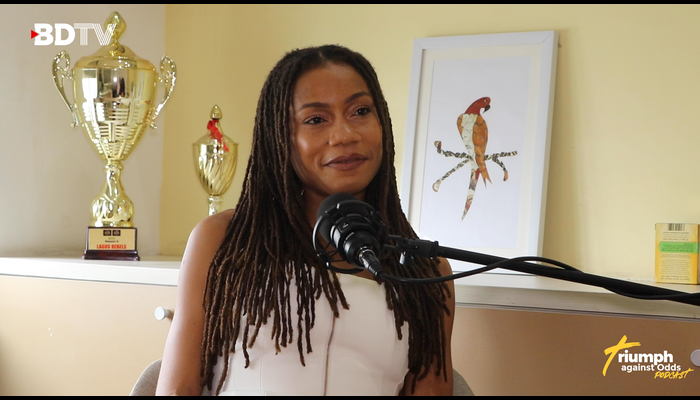Triumph Against Odds: Affiong Williams on building ReelFruit and beating the odds
Reel Fruit founder, Affiong Williams speaks to Obidike Okafor on the second episode of Triumph Against Odds about stubborn resilience, and what it really takes to turn a local snack brand into a global export.
Growing up in Nigeria, where fruit was abundant but often perishable, how did those early experiences shape your outlook on business?
I didn’t grow up directly exposed to fruit perishability. I was raised in Calabar, where my grandfather had a farm, but what shaped me most was freedom. As a child, I was very independent—walking to my cousin’s house alone, buying things at the market to resell, even cooking for older cousins. Those small ventures taught me initiative. They didn’t make me an entrepreneur yet, but they built the confidence and risk appetite I rely on today.
After launching your 800-tonne processing facility, where does ReelFruit stand, local expansion or global scale?
Both, but each comes with challenges. When I was raising money, investors worried I was building for a market that didn’t exist. I needed scale to reduce costs, but couldn’t reach large buyers without scale, it was a chicken-and-egg problem.
After we built the factory, I cold-messaged a buyer in the Netherlands on LinkedIn. She visited Nigeria, and that meeting led to our first export. Another buyer soon followed. Now exports take up most of our capacity.
Our new challenge is raw materials, seasonality, price spikes, and supply gaps. We’ve proven demand exists; now we must secure steady supply. It’s a better problem, but still a big one.
When you started in 2012 importing dried fruit from Ghana, did you ever feel the Nigerian market would reject it?
Absolutely. The first few years were painfully slow. It took about six or seven years to build loyal customers. I remember hearing “Come and pick your product, it’s not selling.” It was discouraging.
What kept me going was youthful defiance, “Nigeria will not defeat me.” I also believed from day one that ReelFruit would be global. That conviction kept me steady even when local sales were crawling.
You once had to convince Nigerians to eat dried mango when fresh ones were everywhere. What old market belief did you have to unlearn?
That every product in Nigeria must be a “₦100 product.” Everyone said, “If it were ₦100, it would sell.” I tried it once, made a ₦100 line, opened a market stall, and it failed badly.
Eventually, I accepted ReelFruit wasn’t a mass-market brand. Once I leaned into being premium, premium product, premium price, consistent audience, everything changed. It’s better to own your identity than chase every customer.
Was there a time you genuinely considered walking away?
Around year eight. I was tired of running a small business and wanted something that could scale. I didn’t see it as failure, I just wanted more. I was even at peace with walking away.
But right then, investment discussions picked up again. Fundraising can be brutal, term sheets that fall through, investors who ghost, but when my current investors came through, it gave the business a new life.
How did you carve a niche in Nigeria’s $10 billion food import market?
From day one, I focused on visibility. Our packaging, bright orange and yellow, stood out on shelves. People even thought we were imported.
Then we went everywhere: schools, hotels, airports, hospitals. Arik Air once ordered 40,000 packs a week. That gave us credibility. Consistency built trust, and before long, we became the go-to brand for dried fruit.
What’s one business decision you avoided too long?
Pricing. For years, I delayed increasing prices even when costs rose. I was scared customers would stop buying. But you can’t build a lasting business on broken margins.
Once we started adjusting prices intentionally, no emotions, just math, the business stabilized. It’s a common trap among entrepreneurs: underpricing from fear. I learned the hard way that survival depends on margin discipline.
If fear wasn’t a factor, what bold move would you make next?
I’ve faced all the fear already. So, if I had unlimited resources, I’d invest massively in tree crops, coconut, mango, cashew, cross strategic states.
Tree crops are long-term assets. Many trees we harvest from today were planted in the 1970s.
They’re profitable for decades and can secure Nigeria’s raw material base. We’re already starting with our first coconut plantation and a demo farm at our factory. It’s small now, but we’re proving the model so others can follow.
If the next five years of your life were a book chapter, what would the title be?
The Galloping Years.
The first 13 years were steady and slow. Now, we’re moving fast, international certifications, an expanded factory, a major European grocery chain as a client, all within a year. The next five years will be about scale, speed, and consolidation. I believe we’ll achieve double what we’ve done so far.
Finally, what’s one truth about entrepreneurship you wish someone had told you in 2012?
That it takes longer than you think. Whatever timeline you imagine, double it. Entrepreneurship compounds; day to day it feels slow, but over a decade it’s massive.
There’s that quote, people overestimate what they can do in a year and underestimate what they can do in ten. That’s exactly my journey. Building something real takes time, and peace with the pace.
Watch the full Affiong Williams interview on YouTube, or Listen to it on Spotify. You can also listen to other episodes Here, or watch the first episode Here

